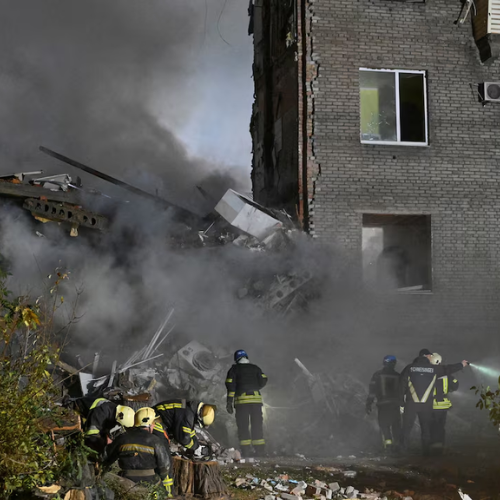Oleh Kolesnikov’s life story is one of loyalty and betrayal, a tale of a man caught between his past, his beliefs, and the devastating realities of war. Born in Ukraine, Kolesnikov grew up during the Soviet era. His family had ties to the Soviet intelligence service, with his father working as a spy in Cuba during the Cold War. With such a background, it’s no surprise that Kolesnikov himself would one day be drawn into espionage.
In the early days of Russia’s full-scale invasion of Ukraine in 2022, Kolesnikov’s decision to help Russia would set him on a dangerous path. He agreed to share sensitive information about military sites and troop movements with the Russian forces, as well as report on missile strikes. He claimed that he wasn’t motivated by money but by his support for the concept of the “Russian World,” an idea promoted by the Russian government that ties together Russian-speaking people across former Soviet territories.
At first, Kolesnikov thought the war would be over quickly. He expected Russia’s military to easily conquer Ukraine. However, as the war dragged on, the devastating consequences of his actions became clear. Kolesnikov began to regret his decision, especially when he saw how inaccurate Russian missile strikes led to the deaths of innocent civilians. Still, his betrayal had already been set in motion, and it would be only a matter of time before his actions caught up with him.
The Path to Betrayal
Kolesnikov’s actions did not go unnoticed. Ukrainian intelligence officials, working tirelessly to protect their country, began to notice strange patterns. After Russian missile strikes in Zaporizhzhia, where Kolesnikov lived, his movements were scrutinized. The SBU (Security Service of Ukraine) began to close in on him, particularly after witnesses reported seeing his car at the sites of missile attacks. In one case, a missile strike hit a television tower and an apartment block, killing civilians. Kolesnikov had been seen at the site shortly after the attack, reportedly checking the damage.
The investigation deepened when Ukrainian agents planted a bug in Kolesnikov’s car. They overheard him discussing his actions with a friend named Vitaly Kusakin, whom he had recruited to help gather more information for the Russians. This was the breakthrough the SBU needed. Through this information, they were able to track Kolesnikov’s phone to several impact sites. In May 2023, he was arrested at his home.
Spy Agency Confirms North Korean Soldier Captured in Russia-Ukraine War
Despite the evidence against him, Kolesnikov pleaded partially guilty during his trial, claiming he didn’t know that his cousin, who had asked for his help, worked for the Russian Federal Security Service (FSB). The court rejected his defense and convicted him of treason, sentencing him to life in prison for providing aid to the enemy. His actions, described in the court’s verdict, included helping the Russians pinpoint military sites, which were later hit by missiles. One such attack targeted a hotel in Zaporizhzhia, killing one civilian and injuring several others.
Kolesnikov’s wife, unable to cope with the betrayal, left him, taking their child with her. His life, once full of promise, had now crumbled under the weight of his choices.
The Larger Spy Network
Kolesnikov’s case is not an isolated one. Since Russia’s invasion, Ukrainian authorities have launched over 3,200 treason investigations, targeting people who have assisted Russia in its attacks or spread pro-Russian propaganda. Some were pro-Russian in their views, while others were blackmailed or manipulated into becoming informants. Ukrainian officials have worked hard to uncover Russian spy networks and identify those who might betray their country. In fact, the SBU uncovered over 90 spy rings over the last two years, which included everyone from ordinary citizens to government officials and military personnel.
As the war has progressed, methods of recruitment have shifted. Before the invasion, Russian agents recruited Ukrainians through direct contacts during visits to Russia. However, now many are found through social media and online platforms, where pro-Kremlin views are monitored. Some individuals are motivated by ideological beliefs, while others are lured by promises of money or threats against their families.
While the Ukrainian government continues to fight against Russian spies, the betrayal from individuals like Kolesnikov remains a painful reminder of the deep divides that have emerged in the country. The conflict is not just fought on battlefields but within the hearts and minds of those caught in the middle. For Kolesnikov, the future now holds only the cold, dark walls of a prison cell, his hopes resting on the distant possibility of a prisoner swap.


